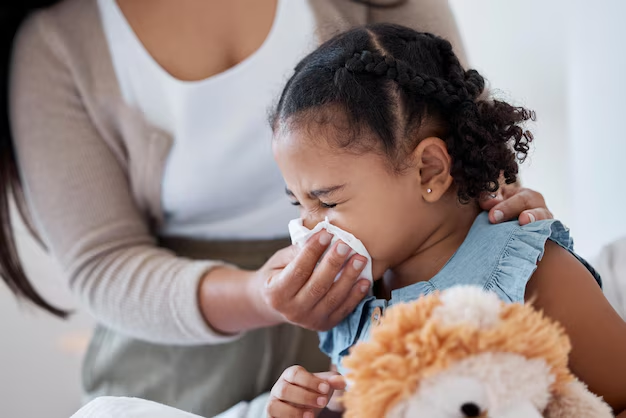Introduction
A baby’s cough can be incredibly worrying, especially for new parents. Is it a harmless tickle, a sign of a cold, or something more serious? Understanding the different types of baby coughs, their causes, treatments, and ways to prevent them can give you peace of mind and help you take the right action.
In this blog, we’ll break down everything you need to know about cough in babies, tailored for gentle parenting audiences and Pinterest moms looking for clear, actionable advice.
What Is A Cough And Why Does It Happen In Babies?
A cough is the body’s natural reflex to clear the throat and airways of irritants, mucus, or germs. In babies, coughs are often a response to minor illnesses like colds, but can sometimes signal something more serious. Knowing the cause can help you decide whether to manage it at home or seek medical help.
7 Common Types Of Cough In Babies
1. Dry Cough
- What it sounds like: Hoarse, hacking, no mucus.
- Causes: Viral infections (cold, flu), allergies, dry indoor air.
- Treatment: Use a humidifier, offer plenty of fluids if age-appropriate, and consult a pediatrician if it lasts beyond a few days.
2. Wet (Productive) Cough
- What it sounds like: Mucusy, rattling sound.
- Causes: Respiratory infections, bronchiolitis, or post-nasal drip.
- Treatment: Elevate baby’s head while sleeping, use saline drops, suction out mucus with a nasal aspirator, and offer breastmilk or formula.
3. Whooping Cough (Pertussis)
- What it sounds like: Intense coughing fits followed by a ‘whoop’ sound when breathing in.
- Causes: Bordetella pertussis bacteria.
- Treatment: Immediate medical attention and antibiotics. Prevent with timely vaccinations.
4. Croup Cough
- What it sounds like: Barking, seal-like cough, worse at night.
- Causes: Viral infections causing airway inflammation.
- Treatment: Humidified air, warm steamy bathroom sessions, or cold night air can help. See a doctor if breathing difficulty occurs.
5. Choking Cough
- What it sounds like: Sudden coughing fit while feeding.
- Causes: Milk or small objects entering the airway.
- Treatment: Stop feeding, help baby clear airway, and if it continues, seek medical help.
6. Asthma-Related Cough
- What it sounds like: Wheezing, persistent dry or wet cough.
- Causes: Allergies, family history of asthma.
- Treatment: Doctor diagnosis needed. Avoid known triggers and follow prescribed medications.
7. Allergic Cough
- What it sounds like: Dry, persistent, worsens with exposure to allergens.
- Causes: Dust, pollen, pet dander.
- Treatment: Limit exposure to allergens, use air purifiers, and consult a pediatrician.
Common Causes Of Cough In Babies
- Viral Infections: Cold, flu, RSV.
- Bacterial Infections: Pertussis.
- Allergies: Dust mites, pets.
- Environmental Irritants: Smoke, strong fragrances.
- Asthma: Less common in infants but possible.
- Gastroesophageal Reflux (GERD): Stomach acid irritating the throat.
- Teething: Increased drooling causing throat irritation.
Safe Home Remedies For Baby’s Cough
- Use a Cool Mist Humidifier: Keeps air moist to ease coughing.
- Saline Nasal Drops & Suction: Clears mucus.
- Elevate Baby’s Head: Helps with night coughing.
- Warm Bath or Steamy Bathroom: Loosens mucus.
- Offer Fluids: Breastmilk or formula to soothe the throat.
- Gentle Chest Rubs: Use baby-safe, fragrance-free rubs.
Note: Never give honey to babies under 1 year due to the risk of botulism.
When To Call The Doctor
- High fever (above 38°C for babies under 3 months, 39°C for older babies).
- Cough lasting more than a week.
- Difficulty breathing.
- Wheezing or blue lips.
- Signs of dehydration (dry mouth, no tears when crying).
- Whooping sound when coughing.
Trust your instincts as a parent if something feels wrong, seek medical help.
Prevention Tips To Keep Baby’s Cough Away
- Hand Washing: Clean hands before touching baby.
- Keep Baby Away From Sick People: Limit visits during flu seasons.
- Use a Humidifier: Maintain good air moisture.
- Clean Baby’s Space Regularly: Dust-free, smoke-free environment.
- Vaccinations: Ensure timely shots including pertussis.
- Breastfeeding: Provides immunity-boosting antibodies.
- Limit Exposure to Allergens: Pet dander, dust, pollen.
Conclusion
While most baby coughs are harmless and clear up on their own, it’s crucial to know the different types, causes, and when to seek medical help. Simple, gentle remedies and preventive practices can go a long way in keeping your little one healthy and cough-free.
By staying informed and trusting your parental instincts, you can confidently care for your baby through those tough coughing spells.
